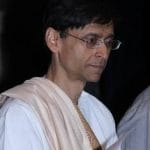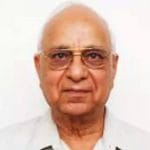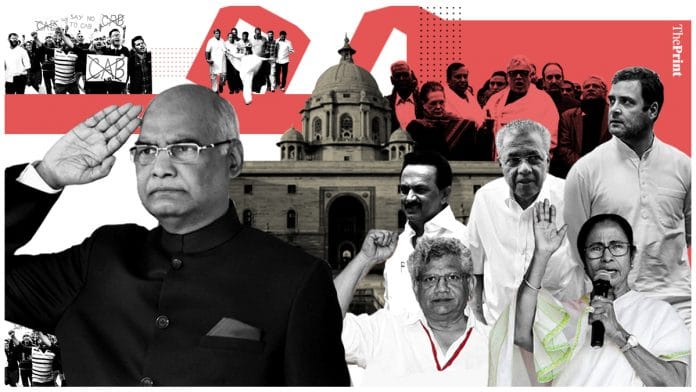As public outcry over the Citizenship Amendment Act continues, representatives of 12 opposition parties met President Ram Nath Kovind Tuesday, requesting him to recommend the Narendra Modi government to take back the “unconstitutional and divisive law”. Congress, CPI(M), TMC, DMK, SP, TMC were some of the parties that sent their delegates.
ThePrint asks: Congress, DMK, TMC, CPI appeal on CAA: Is office of the President still relevant?
President’s office still relevant, especially in case of constitutional crisis. CAA is by no means such a crisis
Makarand R. Paranjape 
Director, Indian Institute of Advanced Study
The President’s office is still relevant, especially in the case of a constitutional crisis. The brouhaha over the Citizenship Amendment Act (CAA) is by no means such a crisis. The bill was passed fair and square after a debate in both houses of Parliament.
Those who argue that the CAA is unjust and was passed only because of a brute majority are mistaken. It is majorities, brute or otherwise, who pass bills, enact legislation, and run democracies. Calling them names when we disagree with them betrays a lack of understanding of, if not disrespect for, democratic institutions.
Why don’t the disgruntled move an amendment to include Muslims facing religious persecution in the CAA? If such an amendment passes, even those who are happy with the Act as it stands right now will have to accept it. That is how democracies function.
But to argue that the President should rescind a law just because members of the opposition find it unpalatable or politically inexpedient goes against the letter and spirit of the Constitution.
It is not a question of whether the office of the President is still relevant. The real question is – why the opposition made up of a bunch of naysayers and bad losers.
Views are personal.
Opposition approaching President after his assent to CAA is an act of political posturing

Subhash Kashyap
Former secretary-general, Lok Sabha and author
The President of India has ceased to have a role anymore. President Kovind has already given his assent to the Citizenship Amendment Act. Both houses of Parliament have also passed it. It has now become a law. The President’s relevance was lost right after he gave his assent.
The opposition parties now have the option of moving the Supreme Court. The President is also a constituent part of Parliament.
The President’s assent becomes an essential part of the legislative process. The act of approaching the President after his assent is merely political posturing.
Constitutionally speaking, an Indian President doesn’t have a political role. Additionally, it is not like the President’s office is the Supreme Court wherein you have the option of filing mercy petitions.
There have been cases in the past where a bill has been passed in Parliament but the President chose not to give his assent. President Kovind had the chance but he chose otherwise in the case of CAA. It would have been more beneficial for the opposition parties to approach him before he gave his assent.
Opposition’s appeal to President Kovind won’t get CAA withdrawn, but it signals how important the issue is
 Shivam Vij
Shivam Vij
Contributing editor, ThePrint
The most egregious abdication of responsibility by President Ram Nath Kovind so far has been the overnight lifting of the President’s Rule in Maharashtra, to facilitate the secretive swearing-in of Devendra Fadnavis.
The President of India is meant to be a rubber stamp on most days, and the current President is from the ruling party. Indians have seen worse Presidents, especially Fakhruddin Ali Ahmed who signed the Emergency declaration.
And yet the office of the President is bigger than the person who occupies the post. The office should not be judged by who occupies it because that can change.
The office of the President of India has a symbolic value. It stands for the Republic, and for the Constitution in a symbolic way that cannot be repudiated either by daily politics or by the incumbent President’s political pressures. This is an office that must be appealed to by the opposition, and by every citizen of India who feels the government of the day is not doing justice to him or her.
It is easy to be cynical about the value of the President’s office at a time when the Narendra Modi government has absolute power and is unstoppable in asserting its brute majority against constitutional morality. It is, therefore, important to invoke constitutional morality by appealing to the office of the President of India, and the conscience of the incumbent at Rashtrapati Bhavan.
The opposition’s appeal to President Kovind is not going to get the Citizenship (Amendment) Act withdrawn, but it is an important way of signalling to the public how important the issue is.
Nothing wrong in opposition meeting President Kovind. His office can’t change govt’s mind anyway
 Alok Prasanna Kumar
Alok Prasanna Kumar
Senior Resident Fellow, Vidhi Centre for Legal Policy
I think the office of the President gains relevance in the absence of real powers. The President of India is supposed to be like the Queen of England who doesn’t have any political power.
It is not like the opposition parties are appealing to a court or an executive authority. They are appealing to President Ram Nath Kovind simply because there is a provision to do so. I don’t think there is anything fundamentally wrong with that.
The President is supposed to listen and speak to everyone but can’t make the government do things or change its mind. In fact, the President acts on the central government’s advice.
The President’s office is relevant in India’s parliamentary democracy. There may be good or bad Presidents or those who agree or disagree with the ruling parties. But as long as they know their limits, the office remains relevant.
In the past, Indian Presidents have taken a stand. They have threatened to exercise a pocket veto. Former President Pratibha Patil commuting death sentences of 35 convicts to life imprisonment could also be seen as taking a stand. An assertive President doesn’t mean s/he picks a public fight. It won’t bode well for the central government or the President.
Nobody expects the President to use independent discretion. India’s first President Rajendra Prasad tried to do that and that resulted in Jawaharlal Nehru being in a constant conflict with him. Former Presidents like Giani Zail Singh, Abdul Kalam, and Pranab Mukherjee proved to be assertive in different ways.
Meek and weak political appointees to Rashtrapati Bhavan, including President Kovind, only follow their party’s agenda
 Maneesh Chhibber
Maneesh Chhibber
Columnist
After every contentious law is passed or the central government does something seemingly unconstitutional, the opposition — irrespective of which party or combination of parties — approaches the President to seek their intervention. But, little, if anything, ever happens.
Now that the Congress, DMK, TMC, CPI and BSP have approached President Kovind on the contentious Citizenship Amendment Act, it will be interesting to see whether he proves to be better than most of his predecessors.
But, having seen President Kovind’s performance since his election in 2017, one has little hope.
After all, he did quietly play along, even signing on the dotted lines at 5.47 am when the Narendra Modi cabinet revoked President’s Rule last month to facilitate the swearing-in of BJP’s Devendra Fadnavis as Maharashtra’s chief minister.
Meek and weak political appointees elected and sent to Rashtrapati Bhavan in recent years have always implemented the agenda of the party that nominated him or her.
President Kovind will prove to be no different.
Also read: The story behind why President Kalam sat on the floor while we sat on chairs
By Kairvy Grewal, journalist at ThePrint







So now the sickular brigade is after the president. After exit polls in May said Modi will be back, some ’eminent’ personalities wanted to approach the UN. Telling how much these sickulars believe in democracy. Comrades, SOS China, now please. And also North Korea for good measure.
Rastrapatiji is an exalted personage whom we all respect. However, the Governors of states do not make even a pretence of being constitutional figures. For the sake of form, slightly better norms could be conveyed to them. Gentleman in Meghalaya could be advised to stop tweeting altogether.
No use in approaching President Ramnath Kovind who is BJP’s Prathiba Patil loyal servant to the family (parivar) Gandhi and Sangh (RSS /BJP). He neither has moral courage at least to summon Home Minister. We are not expecting President to create constitutional crisis for the government of the day. Atleast as first citizen of India, he can show some moral courage to speak for fellow citizen of India.
The President’s oath of office requires him to preserve and uphold the Constitution. His power / authority / influence places him above being merely a nominee of the ruling party, keeping flexible hours for bed tea and a bubble bath. 2. On withdrawing CAA, he evidently has only moral authority, unlike the apex court, which could strike down the law as being violative of the express provisions and basic structure of the Constitution. However, it is perfectly in consonance with the constitutional scheme of things if the Opposition reposes enough faith in his impartiality and sound judgment to call on him and respectfully convey its concerns to him. 3. Whether it is the all powerful apex court or the largely ceremonial office of President, the system affords to each constituent some play and flexibility to push back, urge reconsideration. Quite often nowadays, that is not happening.